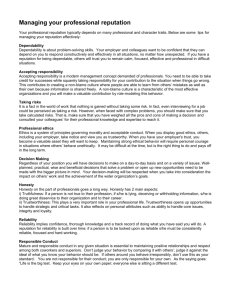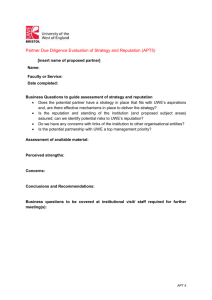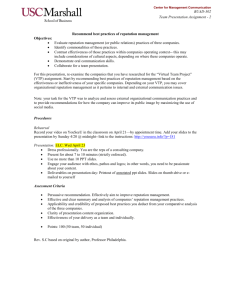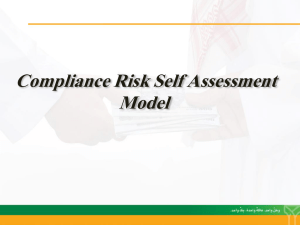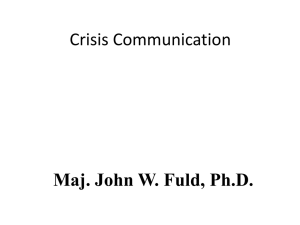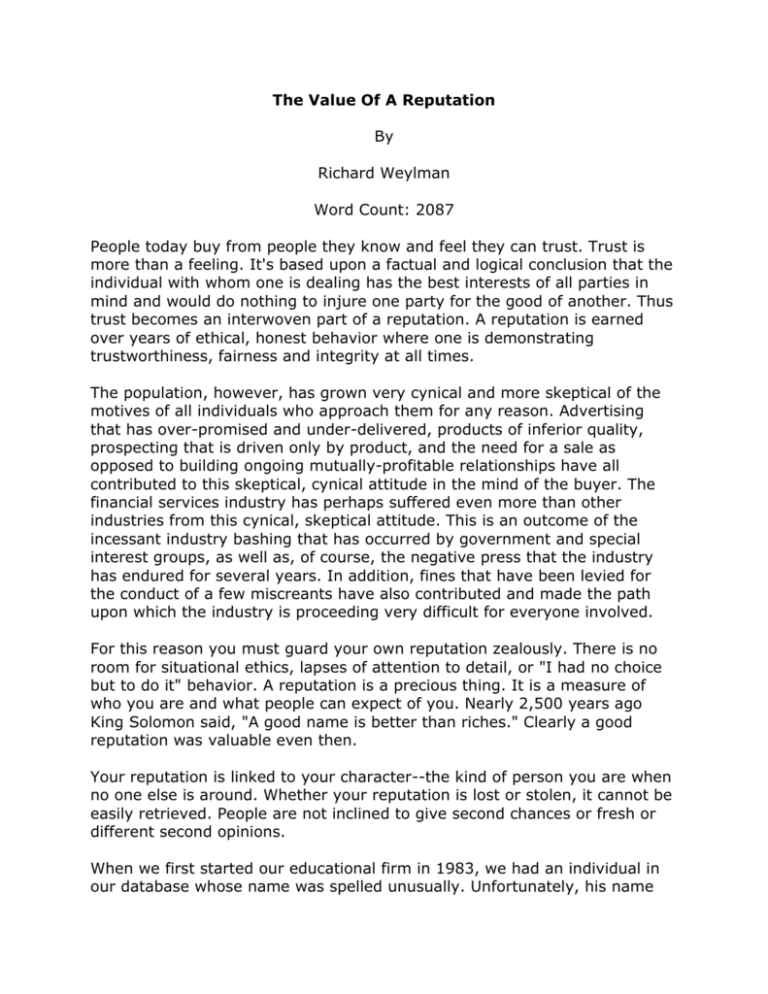
The Value Of A Reputation
By
Richard Weylman
Word Count: 2087
People today buy from people they know and feel they can trust. Trust is
more than a feeling. It's based upon a factual and logical conclusion that the
individual with whom one is dealing has the best interests of all parties in
mind and would do nothing to injure one party for the good of another. Thus
trust becomes an interwoven part of a reputation. A reputation is earned
over years of ethical, honest behavior where one is demonstrating
trustworthiness, fairness and integrity at all times.
The population, however, has grown very cynical and more skeptical of the
motives of all individuals who approach them for any reason. Advertising
that has over-promised and under-delivered, products of inferior quality,
prospecting that is driven only by product, and the need for a sale as
opposed to building ongoing mutually-profitable relationships have all
contributed to this skeptical, cynical attitude in the mind of the buyer. The
financial services industry has perhaps suffered even more than other
industries from this cynical, skeptical attitude. This is an outcome of the
incessant industry bashing that has occurred by government and special
interest groups, as well as, of course, the negative press that the industry
has endured for several years. In addition, fines that have been levied for
the conduct of a few miscreants have also contributed and made the path
upon which the industry is proceeding very difficult for everyone involved.
For this reason you must guard your own reputation zealously. There is no
room for situational ethics, lapses of attention to detail, or "I had no choice
but to do it" behavior. A reputation is a precious thing. It is a measure of
who you are and what people can expect of you. Nearly 2,500 years ago
King Solomon said, "A good name is better than riches." Clearly a good
reputation was valuable even then.
Your reputation is linked to your character--the kind of person you are when
no one else is around. Whether your reputation is lost or stolen, it cannot be
easily retrieved. People are not inclined to give second chances or fresh or
different second opinions.
When we first started our educational firm in 1983, we had an individual in
our database whose name was spelled unusually. Unfortunately, his name
was loaded into our database twice--with two different improper spellings.
He received a letter from me not long after we met and his name was
misspelled. He fired off a letter to me indicating that he wanted the mistake
changed immediately, which we did. However, now knowing that it was in
the database twice, when I sent him my second letter apologizing for the
mistake, his name was again misspelled. Imagine his response when he
came back to us with a very terse reply, "Don't ever contact me again.
Obviously you cannot pay attention to detail."
I could not imagine what had happened, and after we researched it, we
discovered the problem. Of course, I could have told him it was an honest
mistake, and he probably would have said, "I can appreciate that." But there
was no mistake that we had dropped the ball and not guarded our reputation
by double-checking and proofing the letter to make sure it was correct.
Some people would say this was an over-reaction on his part, but I've
discovered over a period of time that it's not always the big things that make
the difference; it's often the little things that sully a reputation. The lesson
we learned from all of this is it has strengthened our resolve to constantly be
on guard and double-check not only our data, but also the details, to ensure
that we do the right thing. You see, your reputation can be lost or stolen not
just by the big things, but by the little things as well. However, one cannot
live in fear of every mistake being the end of a career or a relationship. To
the contrary, a solid reputation in the marketplace will create an atmosphere
of trust and, when appropriate, forgiveness.
To develop a reputation for honesty, integrity and fairness, I encourage you
to practice these principles in your practice:
Principle 1: Align yourself with trustworthy people. In every
organization and every society there are individuals that stand out for their
honest, ethical behavior--individuals whose word is their bond. Identify
these individuals and spend time with them. Develop these individuals as the
friends, mentors and managers with whom you will work. Adapt and adopt
the behavior that they model on a daily basis. Ask yourself what it is that
drives them. Ask them how they make the decisions they make and why
they make them. Learn from the opportunities you have to rub shoulders
with these individuals so that you can begin to re-evaluate your own value
systems and your own foundation to be certain that you're on firm footing.
Principle 2: Have a code of ethics. A great deal has been said about a
code of ethics, however, very little is often placed into practice. The reason
appears to be that too often a code of ethics is exactly that. It's some code
that's mounted on a wall in an office or written in a notebook. A code of
ethics is simply a creed or statement that will help you make decisions. If,
for example, your code of ethics included such things as "Doing the right
things right with my clients' interests first" this would help govern any
behavior where the client is perhaps demanding to buy a particular product
that doesn't fit their portfolio and you know it's not in their best interest.
Your code of ethics will give you the confidence and the passion to explain to
your clients if they are moving in the wrong direction. It will also allow you
to be comfortable when you have to walk away from a situation when you
know that proceeding forward is not only the wrong thing to do
for yourself, but also the wrong thing to do for your client and the company
with whom you associate. A code of ethics need not be a long dissertation,
but simply a short group of words that you have brought together that
articulate how you're going to make decisions and the rules that will govern
you. A code of ethics acts as a wall to contain and to shape your behavior
and decisions and to give you a guide to follow. The common cry, "I don't
know what to do," is often created because a code of ethics is not in place to
guide one's behavior and thus do the right thing. The result is that often the
expedient thing is done instead.
Principle 3: Know your purpose. What is the overwhelming, burning
passion that drives you to continue in the industry? Is it a simple desire to
serve other individuals? Or is it something more complex such as the
purpose that drives me to work in the financial services industry? My mother
died when I was five, my dad when I was six. They had done no financial
planning of any kind and so my brother and sister and I were split up and
lived in foster homes all over New York. I resolved that, once I began this
educational firm, one of my target markets would be the financial services
industry because I have a passion to inspire and educate brokers and others
to see more people and assist them in every way to get their financial affairs
in order. What is it that drives you? What is your passion? With which types
of people do you really enjoy working and want to build future business
around? Where do you see opportunity to serve the marketplace and the
people in it? If your purpose for being in the industry is simply to make
money, I believe that you will find that it leaves a sense of emptiness within
you, because money becomes a very small measure of one's worth. Purpose
not only helps shape your decisions, it helps shape the path you will take
and will enable you to make the right choices and the right decisions to
move ahead.
Principle 4: Practice self-discipline versus self-indulgence. In a time
when society's motto and creed appears to be, "Go with the flow," you would
be well served to stop and adjust your thinking and ask yourself, "How am I
proceeding?" Are you indulging yourself based upon how you feel, or are you
disciplining yourself based upon your ultimate destination? To help you
define whether you're working from a self-indulgence or self-discipline
perspective, consider the following:
Self-indulgence says, "Think about how you feel, then take action or no
action and worry about the consequences later."
Self-discipline says, "Think about the consequences and then decide which
action is appropriate and, having taken the appropriate action, you feel great
afterwards."
I read an interesting study recently of successful women in the marketplace.
They were asked what it was that helped them to be successful. Their
overwhelming response was that they were aware of the consequences of
their behavior prior to making a final decision about the process they were
going to implement. Self-discipline and self-indulgence not only deal with the
issue of making decisions. Self-discipline needs to come into play to limit
your depression and to recognize that life has its ups and downs. By having
made a decision to guide your life by a sense of self-discipline versus selfindulgence, you will not only limit your depressions, you will bounce back
more quickly and won't make bad decisions that injure your reputation
during your down times.
Principle 5: Focus on thankfulness versus entitlement. Sometimes,
because of the nature of the business, a feeling of entitlement can invade
your attitude. This is particularly true as one becomes more credible within a
market. Nothing can destroy a reputation faster than conveying an attitude
that you deserve it. Avoid coming across to others as if they owe you a favor
or they owe it to you to see you. To develop and keep an attitude of
thankfulness, focus on being thankful for the opportunity and business that
you are receiving. Being thankful keeps you in the right frame of mind and
thus earns you respect in the eyes of the buyer. An ancient proverb tells us
that before honor comes humility. It's the thank-you notes that you send
and the sincere appreciation that you show to all concerned that become the
bricks and mortar of your reputation. People begin to perceive you as an
individual who's truly there to serve and not just to sell--who is interested in
binding together with them in a spirit of cooperation, fellowship, and a
relationship that's mutually rewarding.
A reputation is a fragile thing. It must be protected at all costs by realizing
that as the ancient writings tell us, "As a person thinketh in his heart, so is
he." Examine your heart and determine your motives to ensure that you are
building your reputation as an honest, ethical individual with whom people
will want to do business. Guard your reputation zealously and be constantly
on the lookout for the myriad of opportunities to enhance your reputation by
focusing on other people versus yourself.
C. Richard Weylman is an expert in marketing, selling and communicating to
affluent and high net worth people. He is the author of "Opening Closed
Doors, Keys To Reaching Hard-to-Reach People," as well as numerous sales,
relationship and marketing and management audio and video education
programs. To discover the many resources he has to offer you and your
organization, including his speaking topics, free weekly marketing tips
(emailed to you), free articles and much more, go to
www.richardweylman.com or call 1-800-535-4332 to schedule Richard to
speak at your next event.
CopyrightC 2002, Richard Weylman. All right reserved. Richard Weylman,
CSP, serves as President of The Achievement Group, Inc., an Florida-based
consulting firm dedicated to professionally and ethically help people move to
the next level o f productivity and fulfillment. He is the author of "Opening
Closed Doors, Keys to Reaching Hard-to-Reach People" and numerous other
sales, relationship marketing and management audio and video programs.
To receive more ideas and insight on how to market to high net worth
people, recruit quality people, or practice management issues, schedule
Richard to speak at your next meeting, contact the FrogPond at
800.704.FROG(3764) or email susie@FrogPond.com

